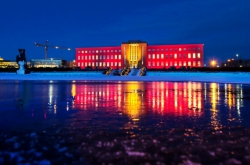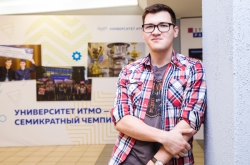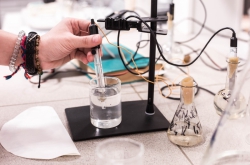You took part in an international double degree program by ITMO University and ENS de Cachan (France). Please tell us how the educational process was organized in each of these universities?
I spent the first year at ITMO University; it included a course of lectures and practical assignments that gave me the fundamental theoretical knowledge and the practical skills necessary for successfully mastering our subjects. Apart from laboratory work, we had the opportunity to partake in one of the research projects conducted at the department. My work had to to do with studying the effect of gold nanoparticles on the process of polymerization initiation for creating composite materials for photonics by means of holographic recording.
During my second year, I studied at ENS de Cachan in France. There, students can choose for themselves the courses they want to take as part of their program, which is a significant difference in approach to education. As the disciplines at ENS de Cachan and ITMO University are interconnected and complement each other, the MONABIPHOT program is really comprehensive. The range of disciplines is quite wide: from those that have to do with fundamental natural sciences to the more subject-oriented ones like nonlinear optics, nanophotonics, biosensor technologies, microfluidics and other. To my mind, among the most interesting were nanophotonics, light-matter interaction, and microfluidics, which gave me a great opportunity to understand how I was going to develop from then on.
A very important question that worries students most when applying for a joint program is financing. How did you solve it?
There are several French grants, some were stated on MONABIPHOT’s website. The scholarship amounts to 1,000 Euro a month, which fully covers expenses on accommodation, transport and food. Surely, if you already have publications or have participated in conferences, you have better chances at getting a scholarship. Yet, from my experience, filing the application properly and gathering the full set of documents already puts you halfway through.
 Uliana Pinaeva with an ENS de Cachan diploma. Credit: personal archive
Uliana Pinaeva with an ENS de Cachan diploma. Credit: personal archive
How did you make the decision to go to France for your PhD program?
As with any Master’s program, in France doing an internship at a laboratory and writing a diploma in the course of your studies is mandatory. I did my internship at the LSI laboratory at Ecole Polytechnique. I found information on the project at the laboratory’s website, wrote to the project’s head and attached a resume. I explained that I was interested in the topic, and I wanted to discuss the possibility of joining the team as an intern. After some time, they responded that they had approved my candidature, and I could start working with them. That’s how I found the laboratory where I started working as a Master’s student and continued my studies at as a PhD student.
How much did studying in a double degree Master’s program prepare you for you further training in France?
I believe that double degree programs are a great thing, as such an educational program at your home university trains you for what awaits you abroad. Let me give you an example. When I was doing my nanophotonics course at ENS de Cachan, there were also students from other universities who followed common two-year Master’s program, i.e. didn’t receive preparatory training at their universities. It was hard for them to follow the course, while I didn’t learn anything fundamentally new (I already knew about the general quantum-mechanical problems and the concepts of producing nanophotonic devices). As a result, some stopped coming to the lessons and had to look for a different subject. This is why double degree programs are so good, they allow you to easily join the educational processes at a foreign university from the early stages.
 ENS de Cachan (currently Universite Paris Saclay). Credit: personal archive
ENS de Cachan (currently Universite Paris Saclay). Credit: personal archive
Those who’ve gone on semester- or year-long exchange programs speak about the differences of educational systems. What skills should one possess to blend into the educational process as fast as possible?
Well, I have to admit that the French and the international educational programs are different. I followed an international program, so it is the only one I can tell you about. If you want to blend in as fast as possible, the most important skill would be English. Not only is it essential for communicating with your group and mastering the educational materials, but also for solving different administrative issues, especially when you only begin your program. Surely, knowing French would have been even better for that purpose, so if you know it as well, your life in France will become all the more easier.
Tell more about your PhD program. What is the educational process like? Which projects do you work on?
A PhD program in France is designed for three years. For this period of time, a PhD student enters a contract with the university, and gets paid for his work. My research work is dedicated to creating functionalized membrane electrodes by means of track etching for analysing heavy metals in water (lead, mercury, etc.). The project lies at the intersection of physics and chemistry and has an application in ecology as a sensor for water quality control. A major difference between a French PhD program in comparison with Russian ones is that the student can choose the disciplines he wants to study, and examinations are not mandatory. The list of disciplines includes both “scientific” and “non-scientific” subjects. For instance, the French course at the university is not “scientific”. As for the “scientific” courses, the students can can look for them on their own, and choose from both those based at the university and outside ones.
 Students during self instruction for light matter interaction
Students during self instruction for light matter interaction
How tight is your schedule?
During my Master’s program, we had lessons five times a week, but each had his individual schedule. As for the PhD program, my schedule is specified, but, according to the contract, I am to work eight hours a day. As I do experimental work, I spend eight hours at the university every day, sometimes more.
What should one pay special attention to when applying? What are the potential pitfalls? Many speak of French bureaucracy, did you encounter a problem with it?
Surely, one can expect having problems with bureaucracy in France.There was a time when a student, an acquaintance of mine, didn’t have medical insurance in his last year of his PhD program. So, you would have to put in effort to get all the necessary documents.
The rules to filling in an application are always clearly explained on the website or in an attached document. In case any questions arise, you should turn to the program’s coordinators, who can help with any difficulties.
How was preparing for your Master’s program abroad different from preparing for your PhD program? How did you find funding the second time?
When applying for financing of my PhD project, I gathered documents according to a list posted on Paris Saclay’s website. As it has already been mentioned above, the selection process was comprised of three stages. The first was filling and sending in the application. If a candidate passed it, they were invited to make a presentation to the jury. The final conclusion was based on the jury’s and the laboratory’s decision. The review process takes up to several months, so it is better to apply for different grants simultaneously.
 Apollo laser at the LSI Laboratory of Ecole Polytechnique
Apollo laser at the LSI Laboratory of Ecole Polytechnique
Many don’t know who to turn to for help with composing a motivation letter, which is one of the most important documents. How does one do it right?
I wrote my motivation letter by myself, based on recommendations from the Internet. Your success in getting financing also depends on whether you’ve stated correct information in your application. As for the motivation letter, it has to have a good structure and be logically relevant. You should describe the program, your practical experience and, which is very important, how the program can benefit your future career.
Do students have an opportunity to do a side job in France?
If we’re talking about Master’s programs, it all depends on whether you got financing. A standard scholarship is 1,000 euros, which is enough to cover all expenses. The university offers a dormitory, which costs no more than half of the scholarship. If you don’t have funding, you have to work. This is a rare occurrence, and really hinders a student’s progress, as they start to lack time. As for PhD programs, one can’t do any jobs apart from the one stated in the contract.
Which places are best to live in - major cities or campuses?
I believe that there’s no real correlation between the city the university is in, and the university itself. Thus, it is best to make your choice based on a particular department or laboratory, not a city. Good universities can be in both big and small towns.

What do you plan on doing after you complete your PhD program in France? Are there any opportunities to stay there to continue your work?
Staying in France is definitely possible. What’s most important is to understand what you want to do next: stay in science or turn to the application field and leave for the industry. Both options are available to foreigners, yet I haven’t made my choice yet, I’m thinking about returning to Russia. I have to note that when looking for a job there, one’s level of French becomes essential, as most employees are Francophone, and the customer bases are aimed at French customers.





